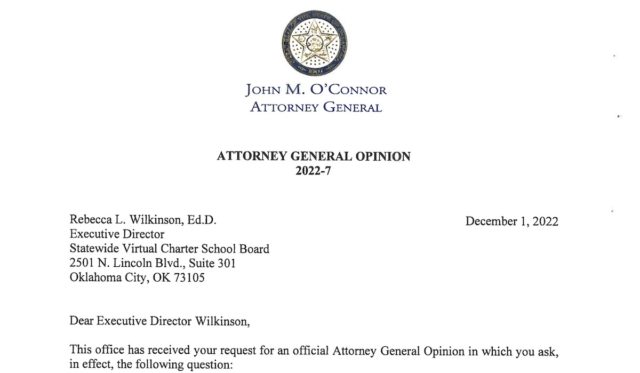

In a 15-page opinion released today, outgoing Oklahoma Attorney General John O’Connor advised charter school authorizers that the aspects of the Oklahoma Charter Schools Act requiring school operators to be non-religious and non-sectarian likely violate the free exercise clause of the First Amendment to the U.S. Constitution and should not be enforced.
Primarily citing three recent U.S. Supreme Court rulings regarding religious liberties in public education — Trinity Lutheran Church of Columbia, Inc. v. Comer (2017); Espinoza v. Montana Department of Revenue (2020); and Carson v. Makin (2022) — O’Connor argued that religiously affiliated private organizations should be allowed to apply to operate charter schools.
“In sum, we do not believe the U.S. Supreme Court would accept the argument that, because charter schools are considered public for various purposes, that a state should be allowed to discriminate against religiously affiliated private participants who wish to establish and operate charter schools in accordance with their faith alongside other private participants,” O’Connor wrote in the opinion which is embedded below.
Charter schools are publicly funded schools that can be governed and operated outside of traditional school districts. The schools can run by private management companies. Currently, Oklahoma statute requires operators of the state’s approximately 30 charter schools to be “non-sectarian” and “non-religious.”
Among the entities allowed to authorizer a charter school in Oklahoma is the Statewide Virtual Charter School Board. Executive director Rebecca Wilkinson originally asked the formal question that resulted in O’Connor’s office issuing an opinion on whether the board may “continue to enforce the nonsectarian requirements set forth” in Oklahoma statute.
Reached for comment Thursday, Wilkinson said she didn’t know the opinion had been released.
“I have not seen it,” Wilkinson said. “I can’t comment on it today, but when we hang up I guarantee you I will be going out to search for it.”
‘Overjoyed with the attorney general’s opinion’
Gov. Kevin Stitt, the Catholic Conference of Oklahoma and the American Federation for Children-Oklahoma celebrated the opinion.
“Attorney General John O’Connor’s opinion rightfully defends parents, education freedom, and religious liberty in Oklahoma,” Stitt said in a statement. “Ultimately, government takes a backseat to parents who get to determine the best learning environment for their child.”
The Catholic Conference of Oklahoma also praised O’Connor’s opinion. In an interview. executive director Brett Farley said the Catholic Conference has an application ready to submit to the SVCSB to operate its own Catholic virtual charter school.
“Obviously, we’re overjoyed with the attorney general’s opinion,” Farley said. “We think that it’s the right opinion, given that the Supreme Court now three times has said essentially the same thing. (…) It’s a major opinion in terms of advancing more options for kids to go to the school that best fits their needs. (…) That’s one of the things that the Catholic Church has always and continues to concentrate on is providing quality education that is affordable.”
The American Federation of Children is a school choice advocacy group. Jennifer Carter, the organization’s senior advisor in Oklahoma, “applauded” the opinion.
“Today’s AG opinion is entirely in keeping with the spirit of what charter schools are meant to be: free public schools that offer tailored experiences to students in addition to those available in traditional public schools,” Carter said in a statement.
It is unclear what direct impacts this opinion will have on Oklahoma charter schools, which have existed since the statute allowing them passed in 1999. However, Farley said the Catholic Conference is prepared to defend its application for a virtual charter school in court. If authorized, the organization would receive public education funding in Oklahoma for the first time, and the new charter school would bolster a Catholic education infrastructure that has faced financial and other challenges in recent years.
Others involved in Oklahoma charter schools took a more measured approach.
“We are reviewing the attorney general’s opinion to determine what impact it may have on the schools and families we serve,” said Barry Schmelzenbach, executive director of the Oklahoma Public Charter School Association. “Our mission remains focused on the critical role public charter schools play in Oklahoma’s education landscape. Our state is better when students have the opportunity to thrive in an environment that best suits their educational and developmental needs. OPCSA exists to provide support to and a voice for Oklahoma’s public charter schools, the students in our classrooms, and the parents who make that choice.”
Generally, attorney general opinions are considered legally binding for public officials. However, when opinions declare state statutes unconstitutional, such as the one released today, they are only advisory.
This opinion is the seventh released this year by O’Connor’s office. The last two, both from November, advised how counties should pay for maintenance of infrastructure that lays on county boundaries and about whether a company can sell its own real estate without a license.
Read the full attorney general opinion
https://nondoc.com/wp-content/uploads/2022/12/AG_Opinion_Charter_Schools.pdf” viewer=”browser”]



















